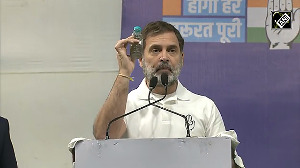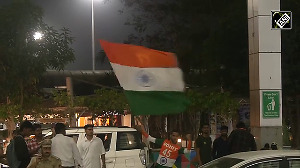Terming it as an immediate challenge to sustain economic growth while keeping inflation under check, Prime Minister Manmohan Singh on Sunday stressed the need to reduce fiscal and revenue deficits and cut down on wasteful subsidies.
Presenting the annual report card of the government, Singh presented a bullish picture of the economy which, he said, grew at a record 8.5 per cent rate during the seven years of the United Progressive Alliance rule despite the global economic slowdown and high fuel and food prices.
Singh, however, warned that the most immediate challenge was to sustain the growth process, while keeping inflation under check.
"... In response to the global economic slowdown, we undertook a massive fiscal stimulus programme that helped maintain reasonable growth. Today, however, we must reduce the fiscal and revenue deficits, increase public investment, and cut down on wasteful subsidies," he added.
The Prime Minister said "this challenge has been made all the more daunting by the rise in world fuel prices. As an importer of oil we have to adopt rational pricing policies."
"This is not just prudent fiscal management. This is a national security imperative. India cannot become too dependent on external sources of energy," he added.
Speaking about food prices, Singh said the country could not become too dependent on world markets for food. "The imperatives of food security impose certain policy options. The Indian farmer has to be empowered with better prices, better policies, better access to finance, to technology, to infrastructure and to markets," he added.
Speaking at the launch of the report card, UPA chairperson Sonia Gandhi also said that the priorities of UPA were to ensure high economic growth while keeping prices of essential items at affordable levels.
In the report card, the government said high prices still remain a major concern and hinted at more steps to contain inflation, especially for the poor and vulnerable sections.
The government said it would seek to contain food inflation through measures for higher production of various agriculture products, while minimising the impact of high fuel prices on 'poor and vulnerable' of the society, it added.
At the same time, the government said it was determined to take India to the select league of "middle income countries".
In the report card, which is being presented every year ever since UPA government came to power in 2004, the Prime Minister Manmohan Singh also said the government has taken many steps to improve production of agriculture commodities to contain inflation and intends to take more steps in future.
"Food inflation was a major concern in 2010-11," Singh, said while adding that various measures were taken by the government to address the problem.
Noting that high fuel prices reflected the global trends, the government said that it was committed to ensuring availability of cooking fuels to the common man at affordable prices.
Singh said that he was sure that "India will soon emerge as the fastest growing economy in the world. We already are the worlds fastest growing democracy."
"We have pursued a strategy of seeking "inclusive growth" at home and "inclusive globalisation" internationally that benefits the have-nots and reduces disparities," he added.
Singh further said that India was going through difficult times, with rising energy prices, with increasing demand for food, with new challenges to human security.
"But these are also times of change, with the engine of global growth shifting eastwards to Asia. Asia is on the march, and so is India," he added.
In the annual report card, Singh further said the government would look to chart an economic growth process that was "socially inclusive and regionally balanced.
"We will endeavour to reduce inequities and inequalities that exist in our country," he added.
The government said it has also simplified its foreign direct investment policy and steps have been taken towards an improved taxation environment through Direct Tax Code and Goods & Services Tax regimes.
While listing out growth in various sectors of the economy, the government also said it was promoting people's ownership of PSUs through its disinvestment programme.
It also said that efforts have continued to strengthen the country's energy and infrastructure sectors, which have been identified as key areas for the India's economic growth.







 © 2025
© 2025